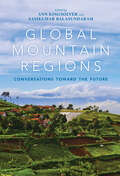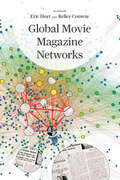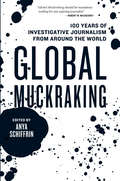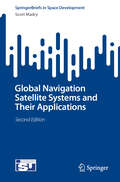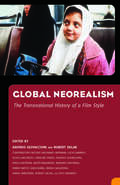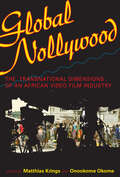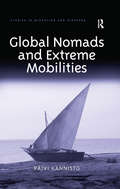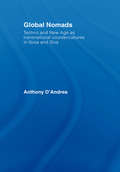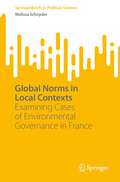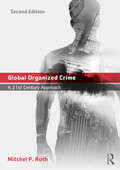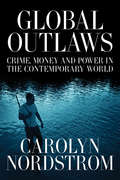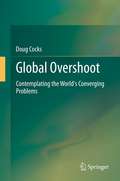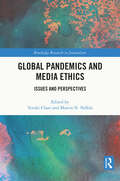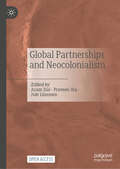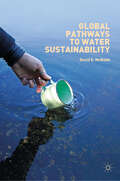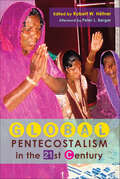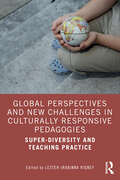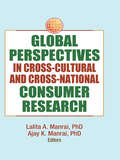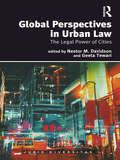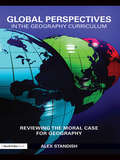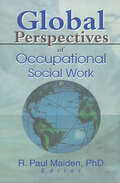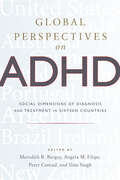- Table View
- List View
Global Mountain Regions: Conversations toward the Future (Framing the Global)
by Edited by Ann Kingsolver and Sasikumar BalasundaramWorks exploring the responses of global mountain communities to the shared challenges and opportunities their unique locations afford them.No matter where they are located in the world, communities living in mountain regions have shared experiences defined in large part by contradictions. These communities often face social and economic marginalization despite providing the lumber, coal, minerals, tea, and tobacco that have fueled the growth of nations for centuries. They are perceived as remote and socially inferior backwaters on one hand while simultaneously seen as culturally rich and spiritually sacred spaces on the other. These contradictions become even more fraught as environmental changes and political strains place added pressure on these mountain communities. Shifting national borders and changes to watersheds, forests, and natural resources play an increasingly important role as nations respond to the needs of a global economy.The works in this volume consider multiple nations, languages, generations, and religions in their exploration of upland communities’ responses to the unique challenges and opportunities they share. From paintings to digital mapping, environmental studies to poetry, land reclamation efforts to song lyrics, the collection provides a truly interdisciplinary and global study. The editors and authors offer a cross-cultural exploration of the many strategies that mountain communities are employing to face the concerns of the future.“Global Mountain Regions is an outstanding addition to the inventory of the interdisciplinary field of montology, the study of mountains. For any scholar or student interested in the human dimensions of mountain regions, many if not all of the essays will be valuable references.” —American Ethnologist
Global Movie Magazine Networks
by Eric Hoyt and Kelley ConwayA free ebook version of this title is available through Luminos, University of California Press’s Open Access publishing program. Visit www.luminosoa.org to learn more. This groundbreaking collection of essays from leading film historians features original research on movie magazines published in China, France, Germany, India, Iran, Latin America, South Korea, the U.S., and beyond. Vital resources for the study of film history and culture, movie magazines are frequently cited as sources, but rarely centered as objects of study. Global Movie Magazine Networks does precisely that, revealing the hybridity, heterogeneity, and connectivity of movie magazines and the important role they play in the intercontinental exchange of information and ideas about cinema. Uniquely, the contributors in this book have developed their critical analysis alongside the collaborative work of building digital resources, facilitating the digitization of more than a dozen of these historic magazines on an open-access basis.
Global Muckraking
by Anya SchiffrinCrusading journalists from Sinclair Lewis to Bob Woodward and Carl Bernstein have played a central role in American politics: checking abuses of power, revealing corporate misdeeds, and exposing government corruption. Muckraking journalism is part and parcel of American democracy. But how many people know about the role that muckraking has played around the world?This groundbreaking new book presents the most important examples of world-changing journalism, spanning one hundred years and every continent. Carefully curated by prominent international journalists working in Asia, Africa, Latin America, Europe, and the Middle East, Global Muckraking includes Ken Saro-Wiwa's defense of the Ogoni people in the Niger Delta; Horacio Verbitsky's uncovering of the gruesome disappearance of political detainees in Argentina; Gareth Jones's coverage of the Ukraine famine of 1932-33; missionary newspapers' coverage of Chinese foot binding in the nineteenth century; Dwarkanath Ganguli's exposé of the British "coolie" trade in nineteenth-century Assam, India; and many others.Edited by the noted author and journalist Anya Schiffrin, Global Muckraking is a sweeping introduction to international journalism that has galvanized the world's attention. In an era when human rights are in the spotlight and the fate of newspapers hangs in the balance, here is both a riveting read and a sweeping argument for why the world needs long-form investigative reporting.
Global Navigation Satellite Systems and Their Applications (SpringerBriefs in Space Development)
by Scott MadryProfessor Madry, one of the world's leading experts in the field of the practical applications of satellites and space technologies, provides in a condensed form, a quick yet comprehensive overview of all aspects of satellite navigation. This new edition concisely addresses the latest breakthrough technologies, the various national systems, the many applications, the regulatory issues, and the strategic implications of satellite navigation systems. The future directions of autonomous aircraft and the role drones play in satellite navigation networks are also evaluated. Moreover, the industry's strengths and weaknesses are discussed, as well as reviews of all the various national systems now being deployed. The motivation behind the proliferation of these systems, in this book, evaluates the overall societal and ethical issues of these invisible yet pervasive parts of our modern digital world.
Global Neorealism: The Transnational History of a Film Style
by Saverio GiovacchiniContributions by Nathaniel Brennan, Luca Caminati, Silvia Carlorosi, Caroline Eades, Saverio Giovacchini, Paula Halperin, Neepa Majumdar, Mariano Mestman, Hamid Naficy, Sada Niang, Masha Salazkina, Sarah Sarzynski, Robert Sklar, and Vito ZagarrioIntellectual, cultural, and film historians have long considered neorealism the founding block of post-World War II Italian cinema. Neorealism, the traditional story goes, was an Italian film style born in the second postwar period and aimed at recovering the reality of Italy after the sugarcoated moving images of fascism. Lasting from 1945 to the early 1950s, neorealism produced world-renowned masterpieces such as Roberto Rossellini's Roma, città aperta (Rome, Open City, 1945) and Vittorio De Sica's Ladri di biciclette (Bicycle Thieves, 1947). These films won some of the most prestigious film awards of the immediate postwar period and influenced world cinema. This collection brings together distinguished film scholars and cultural historians to complicate this nation-based approach to the history of neorealism. The traditional story notwithstanding, the meaning and the origins of the term are problematic. What does neorealism really mean, and how Italian is it? Italian filmmakers were wary of using the term and Rossellini preferred "realism." Many filmmakers confessed to having greatly borrowed from other cinemas, including French, Soviet, and American. Divided into three sections, Global Neorealism examines the history of this film style from the 1930s to the 1970s using a global and international perspective. The first section examines the origins of neorealism in the international debate about realist esthetics in the 1930s. The second section discusses how this debate about realism was “Italianized” and coalesced into Italian “neorealism” and explores how critics and film distributors participated in coining the term. Finally, the third section looks at neorealism’s success outside of Italy and examines how film cultures in Latin America, Africa, Asia, and the United States adjusted the style to their national and regional situations.
Global Nollywood: The Transnational Dimensions of an African Video Film Industry (African Expressive Cultures)
by Matthias Krings and Onookome Okome“Reveals in fascinating detail the wild popularity, controversies, and complaints provoked by this film form . . . shap[ing] the media landscape of Africa.” —Brian Larkin, Barnard CollegeGlobal Nollywood considers this first truly African cinema beyond its Nigerian origins. In fifteen lively essays, this volume traces the engagement of the Nigerian video film industry with the African continent and the rest of the world. Topics such as Nollywood as a theoretical construct, the development of a new, critical film language, and Nollywood’s transformation outside of Nigeria reveal the broader implications of this film form as it travels and develops. Highlighting controversies surrounding commodification, globalization, and the development of the film industry on a wider scale, Global Nollywood gives sustained attention to Nollywood as a uniquely African cultural production.“Offers original material with respect to the transnational presence of Nollywood.” ?Moradewun Adejunmobi, University of California, Davis“Unveils a fascinating variety of the ways in which Nollywood cinema is viewed and interpreted.” ?Research in African Literatures“Delightfully entertaining yet appropriately erudite. . . . A welcome addition to the fields of film, media, African, and cultural studies.” —Cinema Journal“Highly recommended.” ?Choice“[T]he cumulative effect of [these] studies is to provide invaluable information for those wishing to keep up with where African cinema is today.” ?Journal of African History“Global Nollywood represents the most up-to-date research on Nollywood as a transnational cultural practice and is a must-read for scholars and students of African screen media.” —African Studies Review“Ground-breaking. . . . It proves that, in spite of appearing to be a niche market, Nollywood . . . can no longer be excluded from the canon of African cinema in the field of film studies.” ?African Affairs
Global Nomads and Extreme Mobilities (Studies in Migration and Diaspora)
by Päivi KannistoPresenting a ground-breaking study of the emerging phenomenon of location-independence, this book examines the way in which the practices of 'global nomads', who live on the road, without fixed abode, place of employment or localised circle of friends, question many of the unwritten norms and ideals that characterise settled life in societies. With the lifestyles of global nomads blurring the boundaries between travel, migration, and dwelling, Global Nomads and Extreme Mobilities draws on in-depth interviews with a worldwide group of location-independent travellers, together with virtual and instant ethnography and discourse analysis, to show how lives oriented around extreme forms of mobility offer researchers in migration, tourism and mobilities a unique opportunity for examining the complex subjectivities and power relations associated with multi-mobility. <P><P> With close attention to the nationalistic, political, and travel-related attachments of global nomads and the ways in which their own representation and justification of their lifestyles and subjectivities constitute a power negotiation, the book examines 'global nomads' social and intimate relationships and the forms of exclusion and discrimination that they encounter, raising the question of whether they live inside or outside societies - and indeed, whether there can be any life outside societies. A re-assessment of much contemporary research in the fields of mobility, migration and tourism studies, Global Nomads and Extreme Mobilities will appeal to scholars across the social sciences.
Global Nomads: Techno and New Age as Transnational Countercultures in Ibiza and Goa (International Library of Sociology)
by Anthony D'AndreaGlobal Nomads provides a unique introduction to the globalization of countercultures, a topic largely unknown in and outside academia. Anthony D’Andrea examines the social life of mobile expatriates who live within a global circuit of countercultural practice in paradoxical paradises. Based on nomadic fieldwork across Spain and India, the study analyzes how and why these post-metropolitan subjects reject the homeland in order to shape an alternative lifestyle. They become artists, therapists, exotic traders and bohemian workers seeking to integrate labor, mobility and spirituality within a cosmopolitan culture of expressive individualism. These countercultural formations, however, unfold under neo-liberal regimes that appropriate utopian spaces, practices and imaginaries as commodities for tourism, entertainment and media consumption. In order to understand the paradoxical globalization of countercultures, Global Nomads develops a dialogue between global and critical studies by introducing the concept of 'neo-nomadism' which seeks to overcome some of the shortcomings in studies of globalization. This book is an essential aide for undergraduate, postgraduate and research students of Sociology, Anthropology of Globalization, Cultural Studies and Tourism Studies.
Global Norms in Local Contexts: Examining Cases of Environmental Governance in France (SpringerBriefs in Political Science)
by Melissa SchnyderThis Brief discusses the translation of global environmental norms across local contexts in France. It provides a snapshot of how global-level environmental norms travel vertically across levels of governance, from the global to the local, and asks how global environmental norms are (re)interpreted by local-level actors and translated to a particular local context. Chapters focus on three in-depth case studies, each involving multi-stakeholder environmental governance: (1) the Cerbère-Banyuls Marine Nature Reserve, (2) the Thau Fisheries Local Action Group (FLAG), and (3) the Biovallée biodistrict. In each of these cases, the author assesses how twilight norms are used to frame, promote, and generally develop a local discourse that centers on environmental conservation and sustainability. By combining concepts from the literature on norm localization with processes from the literature on norm-based institutional change, this Brief will generate new insights on the dynamic aspects of norm translation. As such, it will be of interest to researchers studying environmental politics, comparative policy, governance, and norms.
Global Organized Crime: A 21st Century Approach (Contemporary World Issues Ser.)
by Mitchel P. RothIn the maelstrom of globalization and cyberspace, organized crime continues to defy definition. A diverse array of activities is perpetuated by criminal organizations, criminal groups and associations, and gangs, and it is clear that one specific label is no longer adequate. This book offers a uniquely global approach to organized crime and the multitude of forces that shape it in the 21st century. As well as discussing definitions of and the historical roots of organized crime, this book examines various forms of organized crime around the world in the US, Mexico, Latin America and the Caribbean, Russia and Europe, Asia and Africa. This revised and updated new edition includes coverage of: the rise of the ’Ndrangheta in Italy and their global expansion; the impact of drug legalization on organized crime and the problem of methamphetamine; organ trading, money laundering, and animal poaching; changes in gang traditions and gangland penitentiaries; the decentralization of Mexican cartels, the growth of opium production in Myanmar, and the drug war in Africa; and the advancement of ISIS and the emergence of the Silk Road and the Dark Net. This book is essential reading for students engaged in the study of global and transnational organized crime, with features including chapter overviews, key terms, critical thinking questions, and case studies.
Global Outlaws: Crime, Money, and Power in the Contemporary World
by Carolyn NordstromCarolyn Nordstrom explores the pathways of global crime in this stunning work of anthropology that has the power to change the way we think about the world. To write this book, she spent three years traveling to hot spots in Africa, Europe, Asia, and the United States investigating the dynamics of illegal trade around the world--from blood diamonds and arms to pharmaceuticals, exotica, and staples like food and oil. Global Outlaws peels away the layers of a vast economy that extends from a war orphan in Angola selling Marlboros on the street to powerful transnational networks reaching across continents and oceans. Nordstrom's extraordinary fieldwork includes interviews with scores of informants, including the smugglers, victims, power elite, and profiteers who populate these economic war zones. Her compelling investigation, showing that the sum total of extra-legal activities represents a significant part of the world's economy, provides a new framework for understanding twenty-first-century economics and economic power. Global Outlaws powerfully reveals the illusions and realities of security in all areas of transport and trade and illuminates many of the difficult ethical problems these extra-legal activities pose.
Global Outsourcing and Offshoring: An Integrated Approach to Theory and Corporate Strategy
by Farok J. Contractor Vikas Kumar Sumit K. Kundu Torben PedersenGlobal Outsourcing and Offshoring deals with some of the most fundamental structural and organizational issues facing many companies today. It considers two key strategic decisions, firstly Outsourcing: which activities or functions should be kept in-house versus outsourced; and Offshoring: in which nation is a particular function or operation best performed? These are interrelated and simultaneous decisions that are changing the spatial and organizational configuration of entire industries. The book integrates academic theories from diverse fields, including Economics, Strategy, and Industrial Organization. Contributions are drawn from scholars from 11 nations, who relate theory to practice in the pharmaceutical, automobile, medical records, appliances, human resource management, and telecommunications fields.
Global Overshoot
by Doug CocksGlobal Overshoot is a multidisciplinary analysis (including history and pre-history) from an ecological and evolutionary perspective of the contemporary world system. This book compares and critiques attitudes held by people with different world views to the hypothetical prospect of large widespread falls in quality of life. It also draws insights from these two analyses to develop and suggest a philosophy of Ecohumanism to people of good will who want to think constructively about the world's converging problems, i.e. think altruistically and 'think like an evolving ecosystem.'
Global Pandemic and Human Security: Technology and Development Perspective
by Rajib Shaw Anjula GurtooThis book highlights how the human security aspect has been affected by the global pandemic, based on the specific case study, field data, and evidence. COVID-19 has exemplified that the pandemic is global, but its responses are local. The responses depend on national governance and policy framework, use of technology and innovation, and people’s perceptions and behavior, among many others. There are many differences in how the pandemic has affected the rich and the poor, urban and rural sectors, development and fiscal sectors, and developed and developing nations and communities.Echoing human security principles, the 2030 Agenda emphasized a “world free of poverty, hunger, disease and want… free of fear and violence… with equitable and universal access to quality education, health care, and social protection….to safe drinking water and sanitation… where food is sufficient, safe, affordable and nutritious… where habitats are safe, resilient and sustainable…and where there is universal access to affordable, reliable and sustainable energy.” These basic human security [PA1] principles and development agenda are highly affected by the global pandemic worldwide, irrespective of its development and economic status. Thus, the book highlights the nexus between human security and development issues. It has two major pillars, one is the development and the other is technology issues. These two inter-dependent topics are discussed in the perspective of the global pandemic, making this the most important feature of this book.While the world is still in the middle of a pandemic, and possibly other natural and biological hazards may affect peoples’ lives and livelihoods in the future, this book provides some key learning, which can be used to cope with future uncertainties, including climate risks. Thus, the book is timely and relevant to wider readers.
Global Pandemics and Media Ethics: Issues and Perspectives (Routledge Research in Journalism)
by Tendai Chari Martin N. NdlelaThis topical volume illuminates ethical issues brought to the fore by the COVID-19 pandemic. Drawing on a broad range of case studies from different regions, it provides insights into the multiple and complex ways in which the pandemic has shaped media ethics. The chapters employ a wide range of innovative theoretical and methodological approaches to dissect enduring and emerging ethical questions during the pandemic, providing lucid accounts of axiological dimensions in pandemic discourses, ethics of emotional mood, ethical challenges and dilemmas in news reporting, propaganda, misinformation, disinformation and Othering. While the case studies in this book are unique, the authors have extrapolated common strands from their analysis of ethical issues applicable to any other country or region during the pandemic, contributing unique perspectives on how media ethics are circumscribed by global health pandemics. The book will appeal to researchers, academics and practitioners at all levels in the fields of media studies, journalism, communication, media sociology and public health, as well as general readers and policymakers who are keen to learn more about how global health crises illuminate critical ethical issues confronting the media.
Global Partnerships and Neocolonialism
by Praveen Jha Aram Ziai Jule LümmenThis open access book points at some of the problematic aspects of international partnerships that continue to be shaped by colonialism. A &“global partnership for sustainable development&” is the 17th of the Sustainable Development Goals (SDGs). However, research points to shortcomings and problematic aspects of international partnerships that have been shaped by colonialism and continue to reflect unequal power relations between the global North and South. Hence, the chapters of this edited volume explore how global partnerships can be established in a neocolonial environment in the fields of development cooperation, the global economy and knowledge production. The contributions were written by members of the Global Partnership Network (GPN), one of the Centres of Excellence for Exchange and Development funded by the German Ministry for Development Cooperation, which has been working intensively and critically on the topic of partnerships and North-South relations over the past four years.
Global Pathways to Water Sustainability
by David E. McNabbThis book investigates the current and future state of freshwater and the global drive to achieve the UN sustainability goal. It first explores the major barriers to achieving the goal and then examines some of the programs water managers are adopting to overcome those barriers. These programs include finding new ways to supplement existing water supplies, and greater acceptance of alternative supplies, such as recycled waste water and desalination; green infrastructures, and rain and storm water harvesting. It concludes with two chapters on water management tools, including asset management and strategic planning, which are of particular interest to small water and wastewater utilities.
Global Pentecostalism in the 21st Century
by Peter L. BergerThis state-of-the-field overview of Pentecostalism around the world focuses on cultural developments among second- and third-generation adherents in regions with large Pentecostal communities, considering the impact of these developments on political participation, citizenship, gender relations, and economic morality. Leading scholars from anthropology, sociology, religious studies, and history present useful introductions to global issues and country-specific studies drawn from Latin America, Africa, Asia, and the former USSR.
Global Perspectives and New Challenges in Culturally Responsive Pedagogies: Super-diversity and Teaching Practice
by Lester-Irabinna RigneyLed by Professor Lester-Irabinna Rigney, Global Perspectives and New Challenges in Culturally Responsive Pedagogies brings together diverse communities of education research in an innovative way to develop a nuanced understanding of the relationship between education and democracy. This book synthesises a range of theoretical, conceptual, and empirical approaches to address the complex challenges faced by young people and societies in the 21st century. Each chapter provides accounts of local inclusive encounters in education, while engaging with global debates and issues, such as racism, neoliberalism, de-colonisation, new colonialism, de-democratisation, and growing social, economic, and educational inequality. This book presents new ways of thinking about democracy, local–global enactments of culturally responsive pedagogies through teaching and learning, and future thinking for a new era. Bringing together diverse, Australian, and international perspectives, this book will be relevant to educators, researchers, and policy makers who are interested in Indigenous education, educational sociology, de-coloniality, cultural safety, critical pedagogy, and education leadership theory.
Global Perspectives for the Conservation and Management of Open-Air Rock Art Sites
by António Batarda Fernandes Melissa Marshall Inés DomingoGlobal Perspectives for the Conservation and Management of Open-Air Rock Art Sites responds to the growth in known rock art sites across the globe and addresses the need to investigate natural and human-originated threats to them as well as propose solutions to mitigate resulting deterioration. Bringing together perspectives of international research teams from across five continents, the chapters in this book are divided into four discrete parts that best reflect the worldwide scenarios where conservation and management of open-air rock art sites unfolds: 1) ethics, community and collaborative approaches; 2) methodological tools to support assessment and monitoring; 3) scientific examination and interventions; and 4) global community and collaborative case studies innovating methodologies for ongoing monitoring and management. The diverse origin of contributions results in a holistic and interdisciplinary approach that conciliates perceived intervention necessity, community and stakeholders’ interests, and rigorous scientific analysis regarding open-air rock-art conservation and management. The book unites the voices of the global community in tackling a significant challenge: to ensure a better future for open-air rock art. Moving conservation and management of open-air rock art sites in from the periphery of conservation science, this volume is an indispensable guide for archaeologists, conservators and heritage professionals involved in rock art and its preservation.
Global Perspectives in Cross-Cultural and Cross-National Consumer Research
by Erdener Kaynak Lalita ManraiGlobal Perspectives in Cross-Cultural and Cross-National Consumer Research deals with several important issues crucial for greater understanding of international and cross-cultural consumer behavior. This understanding in turn can provide international marketers with valuable insights, such as conditions under which globalization may or may not work. The coverage in this book is interdisciplinary in nature, and the chapters discuss several constructs (intermediary variables, processes, and also other environmental influences) related to social, personal, and psychological components or consequences of culture.The book begins with a conceptual model of the effect of culture on consumer behavior, with the components and consequences of the cultural influences clearly identified in terms of social, personal, and psychological factors. The following chapters discuss general issues related to globalization and standardization, present conceptual approaches to propositions relating to multicultural contexts, and address consumer complaining behavior and responses to advertising. There are five chapters on empirical and methodological studies conducted in specific pairs of countries, with data obtained from Canada, Denmark, Japan, Germany, Poland, Romania, and the United States. In presenting readers with new information, Global Perspectives in Cross-Cultural and Cross-National Consumer Research spans these specific topics: the nature of cultural influence on consumer behavior globalization versus customization of international marketing strategy individualism versus collectivism right versus left symbolism product involvement consumer response to information technology interdependent versus independent culturesThe contributors are well-known scholars in the international/cross-cultural marketing field; their chapters present state-of-the-art developments in this area. The coverage of the material is interdisciplinary in nature and is likely to benefit a broad audience, especially academic researchers in international or cross-cultural consumer research and librarians of research-oriented schools, universities, or organizations.
Global Perspectives in Urban Law: The Legal Power of Cities (Juris Diversitas)
by Nestor M. Davidson Geeta TewariThe growing field of urban law demands a collaborative scholarly focus on comparative and global perspectives. This volume offers diverse insights into urban law, with emerging theories and analyses of topics ranging from criminal reform and urban housing, to social and economic inequality and financial crises, and democratization and freedom for individual identity and space. Particularly now, social, economic, and cultural issues must be closely examined in conjunction with the rule of law not only to address inadequate access to basic services, but also to construct long-term plans for our cities and our world—a bright, safe future.
Global Perspectives in the Geography Curriculum: Reviewing the Moral Case for Geography
by Alex Standish‘For geographers across the globe this book provides the arguments for a return to the teaching of geography and why they should reject the politicisation of the subject by education policy makers and politicians. Standish’s careful critique shows the necessity of a depoliticised geography curriculum the irony of which would be that it would ensure that every child could point to Iraq, Iran and Afghanistan on a map.’ Prof. Dennis Hayes – Oxford Brookes University, UK 'A prescient and critical analysis of the changing face of geographyteaching. This book deserves to be widely read and debated. Alex Standish's book puts current trends in geography teaching in historical and critical context. It comprises a forthright and timely defence of geographical education for its own sake.' Dr Jim Butcher, FRSA, Department of Sport Science, Tourism and Leisure, Canterbury Christ Church University. Since the early 1990s, educational policy makers and some subject leaders have been seeking to fundamentally change the teaching of geography in UK and US schools, from a subject which encourages students to explore spatial concepts, ideas and skills, to a more ethics based subject concerned with the promotion of environmentalism, cultural diversity and social justice. In this book the new approach is critically examined, within a historical and ideological context, addressing a number of fundamental questions: Should geography be used as a tool for the delivery of citizenship ideals? How does this affect the intellectual and moral value of geographical education for young people? If the state and teachers are taking more responsibility for the values, attitudes and emotional responses of students, how will they learn to develop these qualities for themselves? If global perspectives shift the focus of education from learning about the outside world to learning about the self, what is its vision of social progress and conception of social change? This book advocates a return to liberal models of education, arguing that the new approach to geography currently being promoted for schools fundamentally undermines the educational value of the subject, and the freedom of young people to shape the world in which they live. A vital resource for teachers and student teachers alike, Global Perspectives in the Geography Curriculum makes a significant contribution to the growing debate about the future direction of the discipline itself.
Global Perspectives of Occupational Social Work
by Paul MaidenExplore the history and practice of social work around the world! This fascinating book presents a broad international survey of the development and current practices of occupational social work. Covering seven countries around the world, Global Perspectives of Occupational Social Work offers a unique cross-cultural perspective on issues of interest to social workers everywhere. From India to Ireland, issues of training, sexual harassment, and workplace health and safety are remarkably similar and intriguingly varied. Global Perspectives of Occupational Social Work describes the evolution of social work in factories and, later, in offices. When industrialization brought women into factories, owners hired nurses or governesses to guard, chaperone, and advise the young women in their employ. Since then occupational social work has sought to keep a balance between the interests of management and workers. In addition to discussing history and professional development, Global Perspectives of Occupational Social Work reveals the way professionals like you handle the same situations you face every day, including: the shift toward privatization corporate restructuring and downsizing developing alcohol and substance abuse interventions creating employee assistance programs racism and sexism in the workplace HIV/AIDS and other health problems workplace violenceCovering Australia, India, Germany, Ireland, South Africa, Israel, and the US, Global Perspectives of Occupational Social Work is a major contribution to the professional literature. Not only will this book increase international awareness, it may supply you with unique perspectives and fresh strategies for solving the problems your colleagues in Jerusalem and Pretoria also face.
Global Perspectives on ADHD: Social Dimensions of Diagnosis and Treatment in Sixteen Countries
by Edited by Meredith R. Bergey, Angela M. Filipe, Peter Conrad, and Ilina SinghExamining ADHD and its social and medical treatments around the world.Attention deficithyperactivity disorder (ADHD) has been a common psychiatric diagnosis in both children and adults since the 1980s and 1990s in the United States. But the diagnosis was much less common—even unknown—in other parts of the world. By the end of the twentieth century, this was no longer the case, and ADHD diagnosis and treatment became an increasingly widespread global phenomenon. As the diagnosis was adopted around the world, the definition and treatment of ADHD often changed in the context of different psychiatric professions, medical systems, and cultures. Global Perspectives on ADHD is the first book to examine how this expanding public health concern is diagnosed and treated in 16 different countries. In some countries, readers learn, over 10% of school-aged children and adolescents are diagnosed with ADHD; in others, that figure is less than 1%. Some countries focus on medicating children with ADHD; others emphasize parent intervention or child therapy. Showing how a medical diagnosis varies across contexts and time periods, this book explains how those distinctions shape medical interventions and guidelines, filling a much-needed gap by examining ADHD on an international scale. Contributors: Madeleine Akrich, Mari J. Armstrong-Hough, Meredith R. Bergey, Eugenia Bianchi, Christian Bröer, Peter Conrad, Claire Edwards, Silvia A. Faraone, Angela M. Filipe, Alessandra Frigerio, Valéria Portugal Gonçalves, Linda J. Graham, Hiroyuki Ito, Fabian Karsch, Victor Kraak, Claudia Malacrida, Lorenzo Montali, Yasuo Murayama, Sebastián Rojas Navarro, Órla O'Donovan, Francisco Ortega, Mónica Peña Ochoa, Brenton J. Prosser, Vololona Rabeharisoa, Patricio Rojas, Tiffani Semach, Ilina Singh, Rachel Spronk, Junko Teruyama, Masatsugu Tsujii, Fan-Tzu Tseng, Manuel Vallée, Rafaela Zorzanelli
